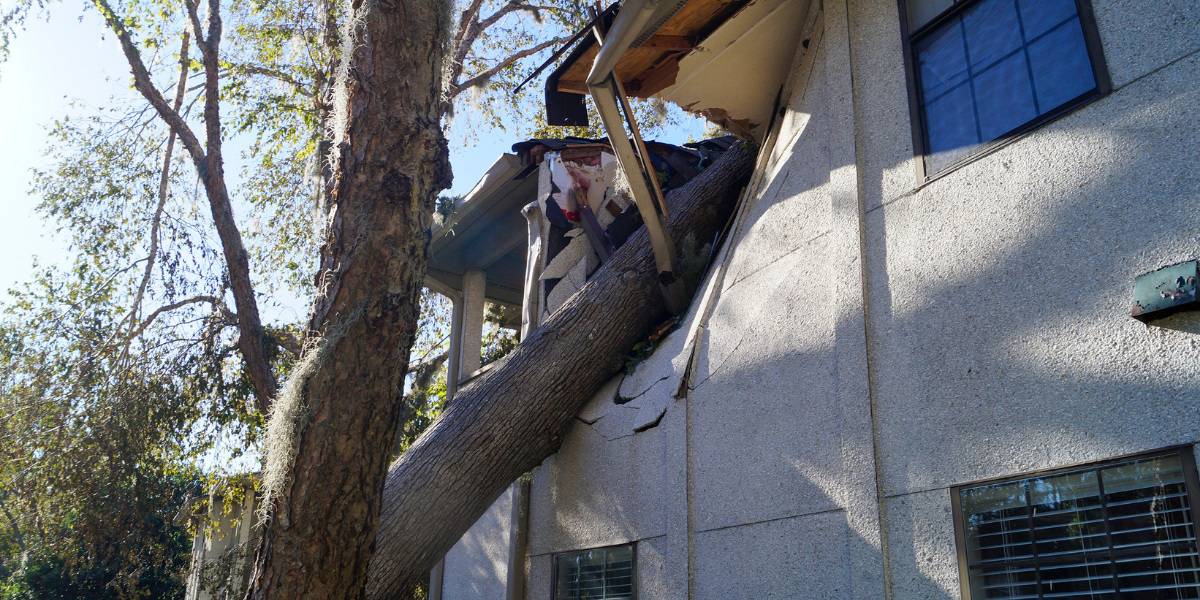
The Real Cost of Distracted & Dangerous Driving
June 11, 2025
Workplace Injuries & Employee Protections
June 20, 2025
Filing an insurance claim after property damage occurs can be complex and stressful. From understanding what your policy actually covers to avoiding common missteps and knowing when legal help might be necessary, being informed is essential to protecting your home and your financial recovery.
How much is my personal property covered for?
A standard home insurance policy will usually provide personal property coverage at approximately 50 to 75 percent of the dwelling coverage. If your dwelling coverage is $300,000, your personal property within should be covered for approximately $150,000 to $225,000.
Although your home insurance policy might indicate personal property coverage of up to $225,000, the actual reimbursement for losses often falls short due to specific category limits. The fine print of your homeowners policy sets strict limits on the maximum the policy will pay for certain property categories. The following are some common limits.
- Cash, coins and precious metals: $250 limit
- Boats, watercraft and their trailers (less than 25 hp): $1,000 limit
- Jewelry, furs, watches and precious stones: $1,500 limit
- Silver, gold or precious metal utensils and dinnerware: $2,500 limit
- Firearms: $2,500 limit
- Tools or other equipment used for your business: $2,500 limit
- TVs, gaming devices and electronics: $1,000 limit
- Computers: $1,000 limit
- Stamp, comic book or baseball card collections: $1,000 limit
Getting Additional Personal Property Coverage
If those policy limits are too low for your situation, there are endorsements, or riders, and floaters which can expand your coverage.
Endorsements
These are the most affordable way to increase personal property limits. For a modest increase in your monthly premium you can significantly increase personal property coverage for certain categories. Endorsements, also referred to as riders, sometimes let you add additional loss conditions, or “perils”, meaning a type of loss, like accidental loss, which normally wouldn’t be covered, now would be. Many policyholders find additional coverage to be surprisingly affordable. Art, for example, can be insured at “agreed value” with the insurance company. Each $100 of additional coverage only costs 15 to 35 cents per year. At that rate, $100,000 of coverage would cost between $150 to $350 a year.
Normal endorsements are capped at certain levels. If you have an especially expensive wedding ring, for example, an endorsement that maxes out at $10,000 may not be enough. For these items, a scheduled property floater is the solution.
How do floaters work?
- You get the items (such as jewelry, furs, antiques or a collection) professionally appraised by an insurance-company approved appraiser.
- The specific item is insured for the appraised amount.
- Floaters can also add additional loss conditions, expanding the scope of potential perils that are covered.
- Even if you lost the ring by accident, the policy would pay out the insured amount.
Breakdown of Your Property Damage Insurance Policy
Understanding the nuances of your homeowners insurance policy is crucial, especially when disaster strikes. While a standard policy offers broad protection, knowing the specifics of each coverage type can help you prepare for the unexpected and navigate the claims process more effectively. Your policy typically breaks down property damage coverage into several key categories.
Dwelling Coverage
Dwelling coverage provides the foundational protection for the physical structure of your home itself. This includes the walls, roof, floors, and built-in fixtures like fireplaces, as well as carpeting and the permanent elements of your decor. Essentially, if it’s a fixed part of your house, it falls under Dwelling coverage.
Other Structures
Beyond the main house, Coverage B extends to Other Structures on your property. This ensures that detached buildings, such as a standalone garage, a backyard work shed, or the fencing enclosing your yard, are also protected from damage. These structures, while separate from your main dwelling, are considered part of your insured property.
Personal Property
This is where your belongings like electronics, jewelry, furniture, and clothing are covered, though often subject to specific limits. Understanding these sub-limits is vital to avoid surprises when making a claim for damaged or lost personal items.
Loss of Use Coverage
This is designed to provide financial support if your home becomes uninhabitable due to a covered loss. This invaluable coverage can reimburse you for essential living expenses like temporary lodging, meals, increased utility costs, and even gasoline, ensuring you have a place to stay and can maintain some normalcy while your home is being repaired.
Most Common Claim Types in Florida
Florida homeowners face a unique set of risks due to the state’s climate and geography, leading to a high number of property insurance claims each year.
Wind
The majority of tropical storm and hurricane damage claims are related to wind damage. Even unnamed storms can knock weak trees onto cars and homes, tear off compromised shingles or drive rain into previously compromised roofing.
Water
Insurance should cover some types of flooding, just not storm surge or natural flooding. Plumbing leaks make up a large percentage of homeowners claims. Water damage in Florida can lead to further damage such as mold, which can be extremely toxic. Failing to take steps to mitigate water damage as soon as it’s spotted could compromise your claim chances.
Lightning/Fire
The National Fire Protection Association estimates that between 2007-2011 around 22,600 fires were started from lightning. Florida had 1,385,710 cloud-to-ground lightning flashes in 2019. At least one thunderstorm occurs in Florida approximately 70 to 100 days a year.
When Should You Get an Attorney Involved with Your Property Damage Claim?
Whether or not you should get an attorney involved with your property damage claim has a lot to do with the type of property damage you suffered. Most property damage attorneys won’t get involved with an auto accident claim, for example, unless there were injuries involved, because the value of vehicles would rarely net a large enough settlement to make their time worthwhile.
However, if a vehicle were to run into your house or business and cause a significant amount of damage and your insurance company isn’t treating your claim fairly, a property damage attorney may be more inclined to intervene.
Types of Property Damage That May Justify Contacting a Property Damage Attorney
Property damage attorneys tend to have the most impact on settlements when the case is related to damaged homes or businesses. Home and business owners frequently seek the services of an attorney for claims involving:
- Hurricane damage
- Wind damage
- Fire and smoke damage
- Water leaks and burst pipes
- Home sinking (subsidence)
- Construction defects
- Foundation issues
Homeowners and business insurance policies are very complicated documents, and its understandable that many policyholders don’t completely understand what types of damages are covered by their policy. A property damage attorney can provide guidance regarding what your policy covers and can give you an honest assessment of the insurance company’s settlement offer.
If your insurance company is undervaluing your claim or acting unfairly, a situation known as bad faith, a property damage attorney can help you understand your rights and pursue the compensation you’re entitled to.
What Is Insurance Bad Faith?
In the U.S., insurance companies are legally obligated to operate in good faith and deal fairly with their policyholders. The major insurance carriers go to great lengths to give themselves cover by crafting complex policies that contain dozens or even hundreds of exclusions and limitations – meaning your policy doesn’t cover you for a long list of potential damages.
Bad faith insurance cases allow the policyholder to recover the money they deserve or, in the most severe cases, even more money than their claim would have paid had the insurance company operated in good faith.
That doesn’t mean insurance companies never act in bad faith or always provide the fair service and claim evaluations their policyholders deserve.
Claim valuation is often influenced by many factors, such as claims adjuster bias or insurer priorities. Claims adjusters and other decision makers in the process are beholden to the insurance company’s interests, which means they may make decisions that are good for the insurance company but not you, the policyholder.
Why Is Bad Faith Insurance Such an Issue?
Insurance companies operate primarily to generate profit, not to maximize policyholder payouts. They fundamentally make decisions intended to maximize their profit, which usually means keeping revenue (the premiums you pay) high while minimizing their costs (the claims they pay you for damages).
It’s in their best interest to find ways to minimize your claim or deny it altogether.
Whether or not you should call a property damage attorney for your claim should depend on the situation and how your insurance company is treating you.
If they are willing to pay you the money you need to restore your home to the way it was before the damage, you likely won’t need an attorney. If the insurance company’s claims adjuster says “sorry, your policy doesn’t cover that,” it may be in your best interest to contact an independent claims adjuster or an attorney for assistance.
Steps to Take When Filing a Homeowners Insurance Property Damage Claim
Filing a homeowners insurance claim can be overwhelming, but knowing what to do in the immediate aftermath of property damage can make a significant difference in how smoothly the process goes. The steps below can help you protect your rights and strengthen your claim.
Contact Your Home Insurance Company
Your policy will require you to contact your insurance company as soon as possible after damage. When you first contact your insurance company, make sure you have:
- Your policy number
- The source of the damage
- Details of the damage
Make sure you take photos and thoroughly document your home’s damage before cleaning up or patching anything.
Protect Your Property From Further Damage
Put tarps over roof damage, cover broken windows and take other steps to prevent further damage from occurring. You have a contractual obligation to prevent additional damages or injuries that could occur if hazards aren’t fixed.
Contact Professionals Who Will Look Out For Your Best Interests
The insurance company will send out their own claims adjuster to determine what they think it will cost to repair your home. This adjuster has an incentive to save the company money by underestimating or improperly categorizing your damages.
If you have a wind damaged roof, contact a roofer to get a professional second opinion. Don’t be afraid to contact a public adjuster or property damage lawyer if you think your claim is being undervalued.
What Not To Do After a Property Damage Claim
While it’s important to act quickly after your home has been damaged, some actions can hurt your claim or delay compensation. Avoid these common mistakes to protect your rights and maximize your recovery.
Don’t Put Your Own Money Into Expensive Repairs And Replacement
You may want to get your home back to normal as soon as possible, but it’s important you don’t make any modifications or invest your own money into permanent repairs until you’ve received a written agreement with the insurance company.
Don’t Lose Or Throw Away Evidence Of Damage
You should keep receipts of everything the storm cost you, from new clothes you had to buy to receipts for staying in motels, eating at restaurants or buying supplies at the hardware store. Also hold on to all photographic evidence of the damage.
Don’t Use The Insurance Company’s Contractors Without Doing Your Own Research
You may choose to use the insurance company’s contractors if you are confident in their services. However, homeowners often benefit more by selecting independent contractors who work directly for you rather than the insurance company.

